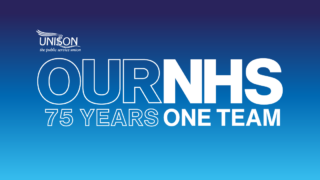New Public Health England guidelines have watered down the level of protection needed for front line health staff battling the Covid-19 epidemic.
Staff will be told they can now use plastic aprons rather than full-length gowns, when there are shortages.
UNISON head of health Sara Gorton said: “These are absolute worst case scenario measures, which staff hope their organisations won’t have to implement.
“No part of the NHS should use this move as an excuse to ration supplies of gowns when they still have stocks. That would cause a damaging breakdown of trust at a time when staff are working under intense pressure.
“Managers must be truly honest with health workers and their union reps over the weekend. If gowns run out, staff in high risk areas may well decide that it’s no longer safe for them to work.”
PPE guidance
UNISON has issued the following advice to branches about the safety of staff if working with insufficient levels of PPE.
We have been advising reps to take the following steps if the member is unsure they have the correct equipment or unhappy with what they have been issued:
- Check what PPE the guidance says is suitable for the setting,
- If the equipment does not meet the requirements set out in the guidance – approach the employer asking them to provide the correct equipment, and escalate that request within the management structure – with support from your staff side lead/region if needed,
- If the equipment provided matches that which is set out in the guidance, but members think they should have higher levels – approach the employer and ask if a risk assessment has been completed for that environment,
- If no risk assessment has been completed, ask for a dynamic risk assessment to be undertaken, working with a UNISON health and safety rep if possible,
- If a risk assessment has been completed, ask for this to be shared with staff in the relevant team and – if possible – for the infection control lead to talk staff through the findings,
- If there are still concerns from individuals or groups of members, reps will need to follow up with the employer and agree how these issues can be resolved. This may involve an agreement to provide a higher level of PPE than that set out in the risk assessment and formal guidance; temporary redeployment of an individual to other duties; agreement of close monitoring of each shift by infection control leads; regular review of the risk assessment.
UNISON members should not put themselves at risk. If members are not able to access a risk assessment or the equipment that is identified in a risk assessment as necessary to protect the member of staff is not made available, then the union may need to advise members that the employer has not taken all necessary steps to control the risk of infection and that entering the work environment would lead to serious and imminent danger to the members or others.
In these circumstances, you should escalate immediately to ask for action to address the issue so members can enter or be provided with alternative ways of working in the interim. Members should document and report their actions and you should report the situation through to your UNISON region, asking them to inform the health team.
As the COVID-19 virus spreads, find out what your rights at work are.


